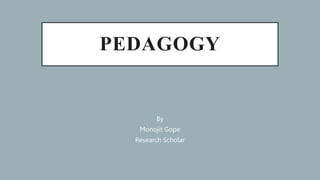
Pedagogy.pptx
- 2. WHAT IS PEDAGOGY Pedagogy is the theory and practice of learning and teaching. It is the art and science of how to teach effectively. Pedagogy is a broad field that encompasses a variety of theories, methods, and practices. The word pedagogy comes from the Greek words paidagogos, which means "leader of children," and paideia, which means "education." Pedagogy is concerned with the process of learning and how to create effective learning experiences.
- 3. HISTORY OF PEDAGOGY The history of pedagogy is a long and winding one, dating back to the ancient Greeks. Over the centuries, educators have developed a variety of theories and methods for teaching children and adults. In ancient Greece, education was seen as a way to prepare citizens for participation in government and society. The most famous Greek educator, Socrates, believed that the best way to learn was through dialogue and questioning. His student, Plato, founded the Academy, one of the first universities in the world. In the Roman Empire, education was more focused on practical skills, such as reading, writing, and arithmetic. The Romans also developed a system of public schools, which were open to all citizens.
- 4. KEY FIGURES • Here are some of the key figures in the history of pedagogy: Socrates (469-399 BCE): Greek philosopher who believed that the best way to learn was through dialogue and questioning. Plato (428-347 BCE): Greek philosopher who founded the Academy, one of the first universities in the world. Quintilian (35-100 CE): Roman rhetorician who wrote a famous treatise on education. John Amos Comenius (1592-1670): Czech educator who advocated for a more natural approach to education.
- 5. KEY FIGURES Jean-Jacques Rousseau (1712-1778): French philosopher who believed that children should be allowed to learn at their own pace. Horace Mann (1796-1859): American educator who led the movement to create a system of free public schools for all children. John Dewey (1859-1952): American philosopher and educator who believed that education should be based on experience and problem-solving. Lev Vygotsky (1896-1934): Russian psychologist who believed that children learn through social interaction. Jerome Bruner (1915-2016): American psychologist who developed the concept of scaffolding, which is a way of providing support to learners as they move towards independence.
- 6. PRINCIPLES OF PEDAGOGY • Here are some of the key principles of pedagogy: Learning is a process: Learning is not something that happens overnight. It takes time, effort, and practice. Learners are different: Not all learners learn in the same way. Some learners prefer to learn by listening, while others prefer to learn by doing. Motivation is important: Learners are more likely to succeed if they are motivated to learn. Assessment is important: Assessment can help educators to identify what learners know and what they need to learn. Reflection is important: Learners can benefit from reflecting on their learning.
- 7. CHARACTERISTICS OF PEDAGOGY There are many different characteristics of pedagogy, but some of the most important include: Active learning: Pedagogy should be student-centered and focus on active learning. Students should be actively engaged in the learning process, rather than passively receiving information. Constructivism: Pedagogy should be based on the constructivist theory of learning. This theory states that learners construct their own knowledge by actively engaging with the material. Differentiation: Pedagogy should be differentiated to meet the needs of all learners. This means that teachers should tailor their instruction to the individual needs of each student.
- 8. CHARACTERISTICS OF PEDAGOGY Reflection: Pedagogy should be reflective. Teachers should reflect on their teaching practices and make adjustments as needed. Collaboration: Pedagogy should be collaborative. Students should collaborate with each other and with their teachers to learn. Assessment: Pedagogy should be assessed to determine its effectiveness. Teachers should use a variety of assessment methods to measure student learning.
- 9. BENEFITS OF USING PEDAGOGY • Here are some of the benefits of using pedagogy in the classroom: Increased motivation and engagement: When learners are motivated to learn, they are more likely to be engaged in the learning process. Improved retention of information: When learners are actively engaged in the learning process, they are more likely to retain the information that they are learning. Increased problem-solving skills: When learners are given opportunities to solve problems, they develop their problem-solving skills. Enhanced creativity and innovation: When learners are encouraged to be creative and innovative, they develop these skills.
- 10. MODERN PEDAGOGY Modern pedagogy is based on the work of a number of different theorists, including John Dewey, Jean Piaget, and Lev Vygotsky. Dewey believed that learning should be active and experiential. Piaget believed that children learn through a process of assimilation and accommodation. Vygotsky believed that children learn through social interaction.
- 11. CONCLUSION Pedagogy is a complex and ever-evolving field. There is no one right way to teach, and what works for one group of students may not work for another. However, the approaches and characteristics listed above can help teachers create effective learning environments that promote student success.
- 12. THANK YOU
